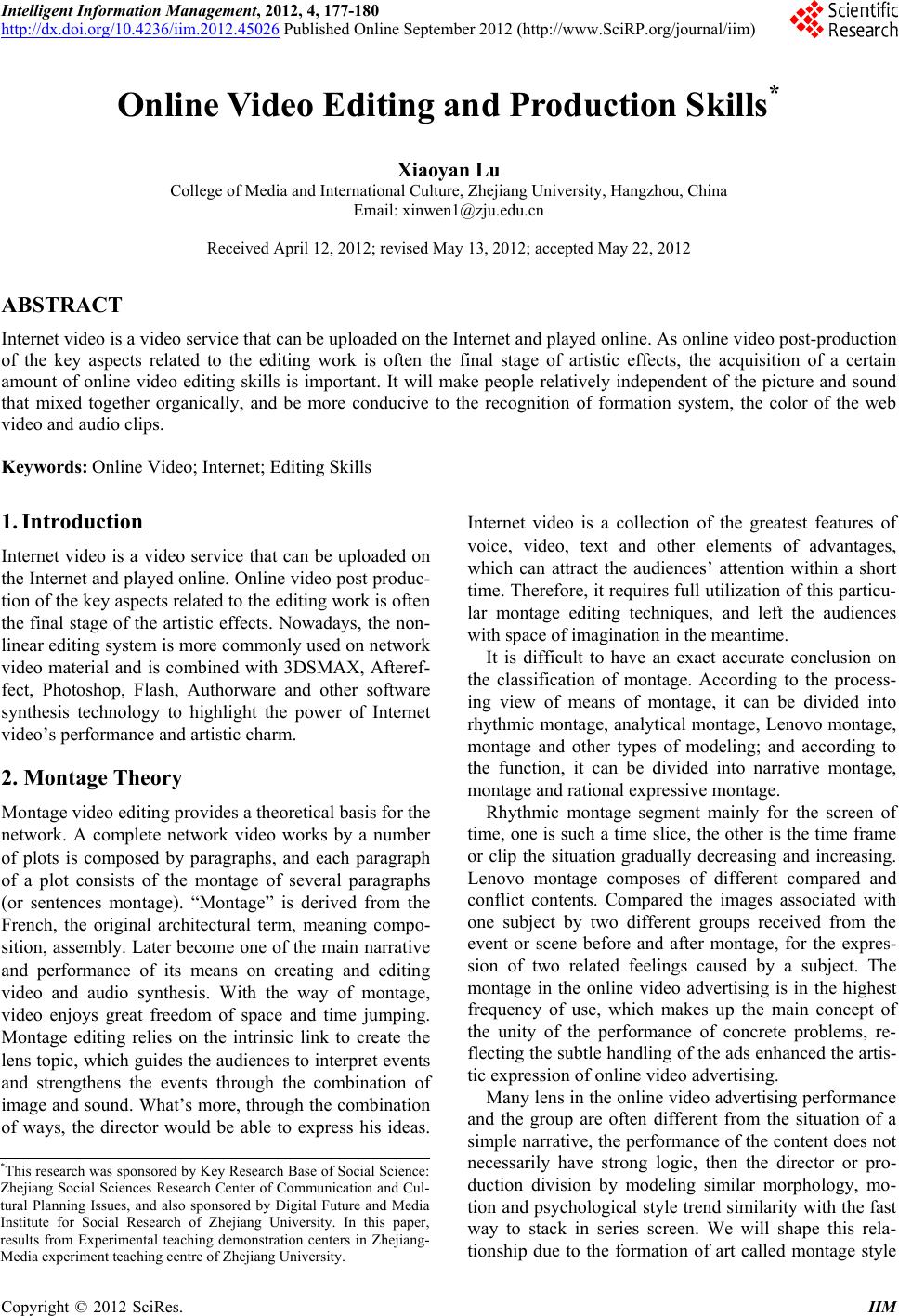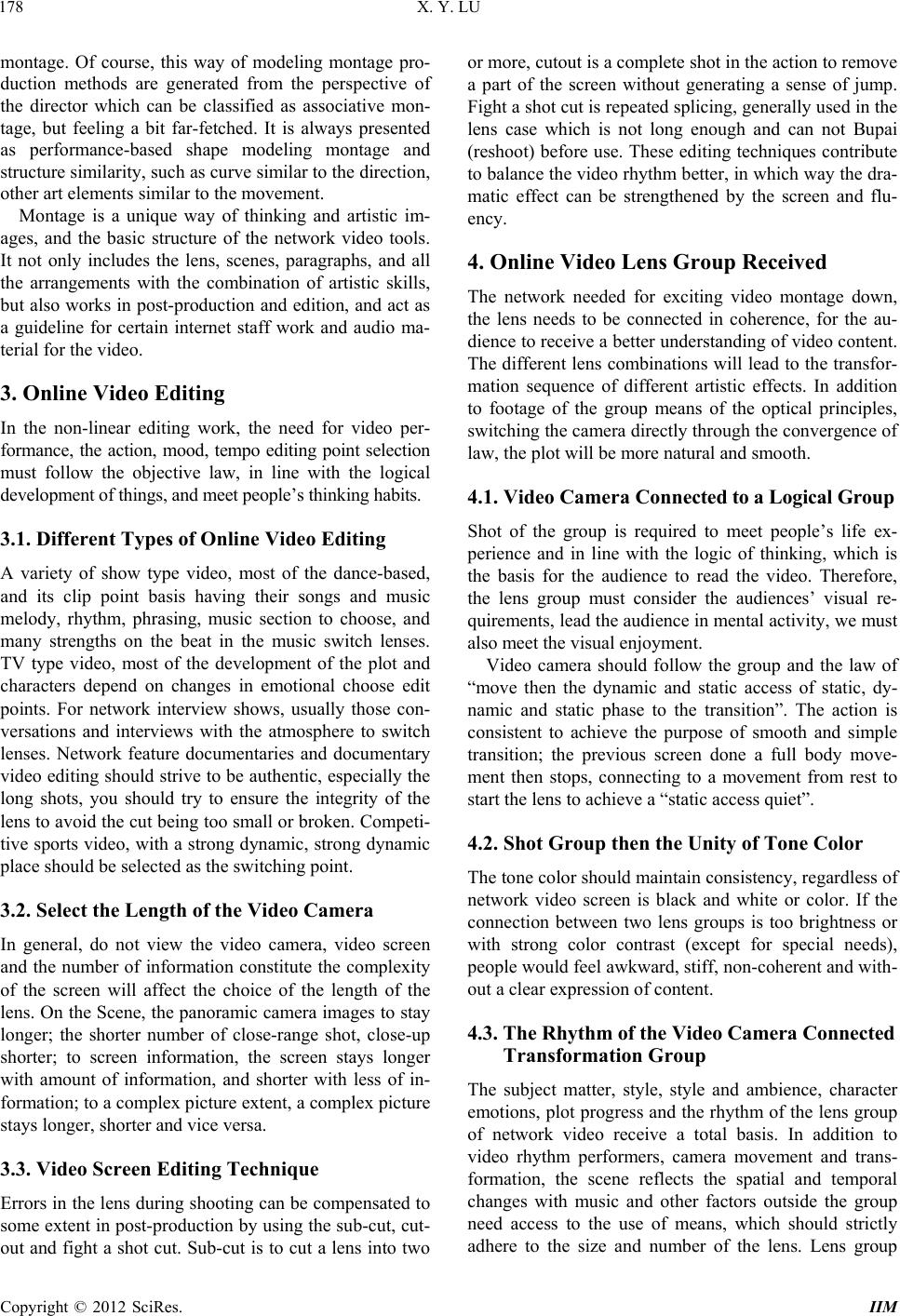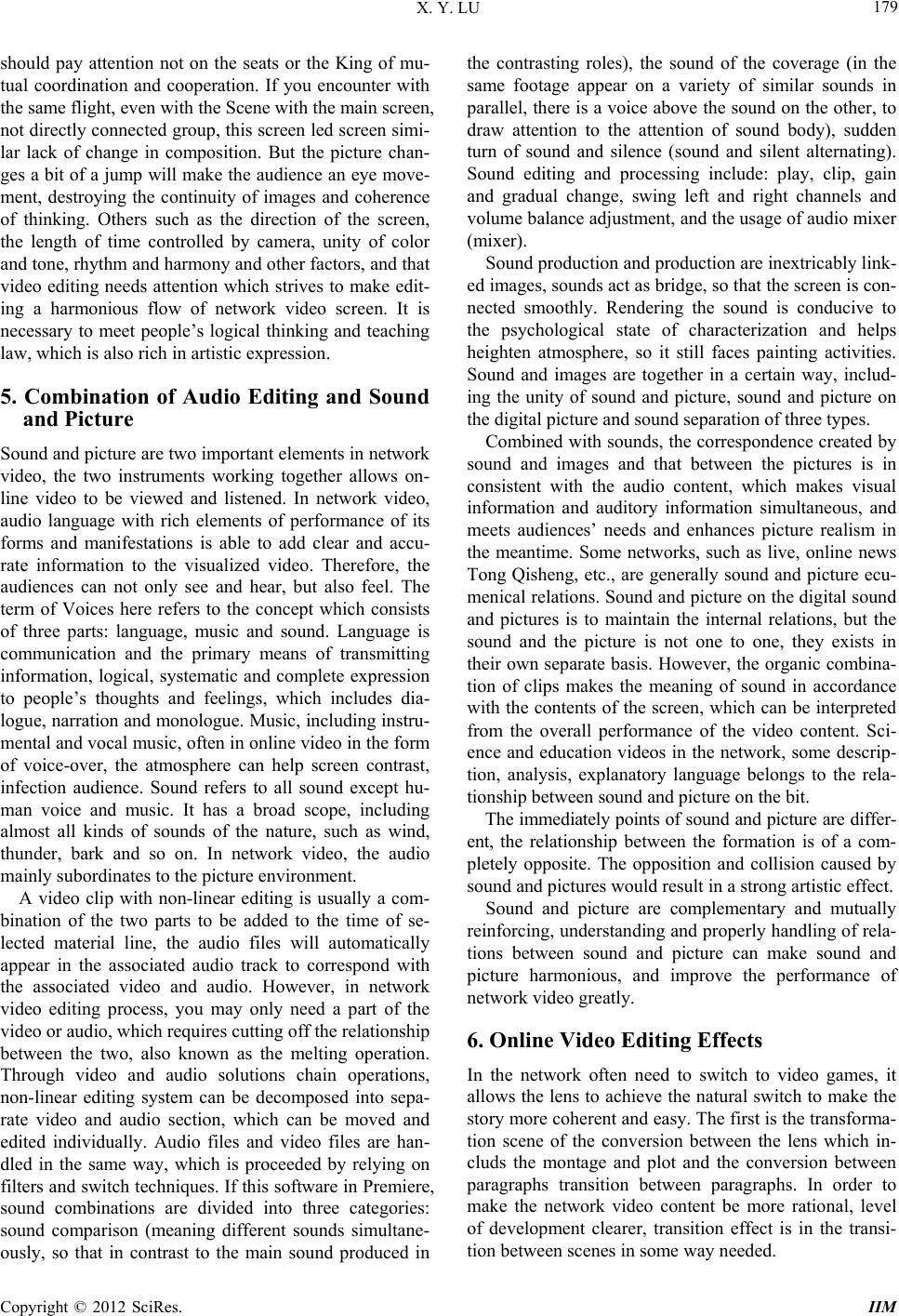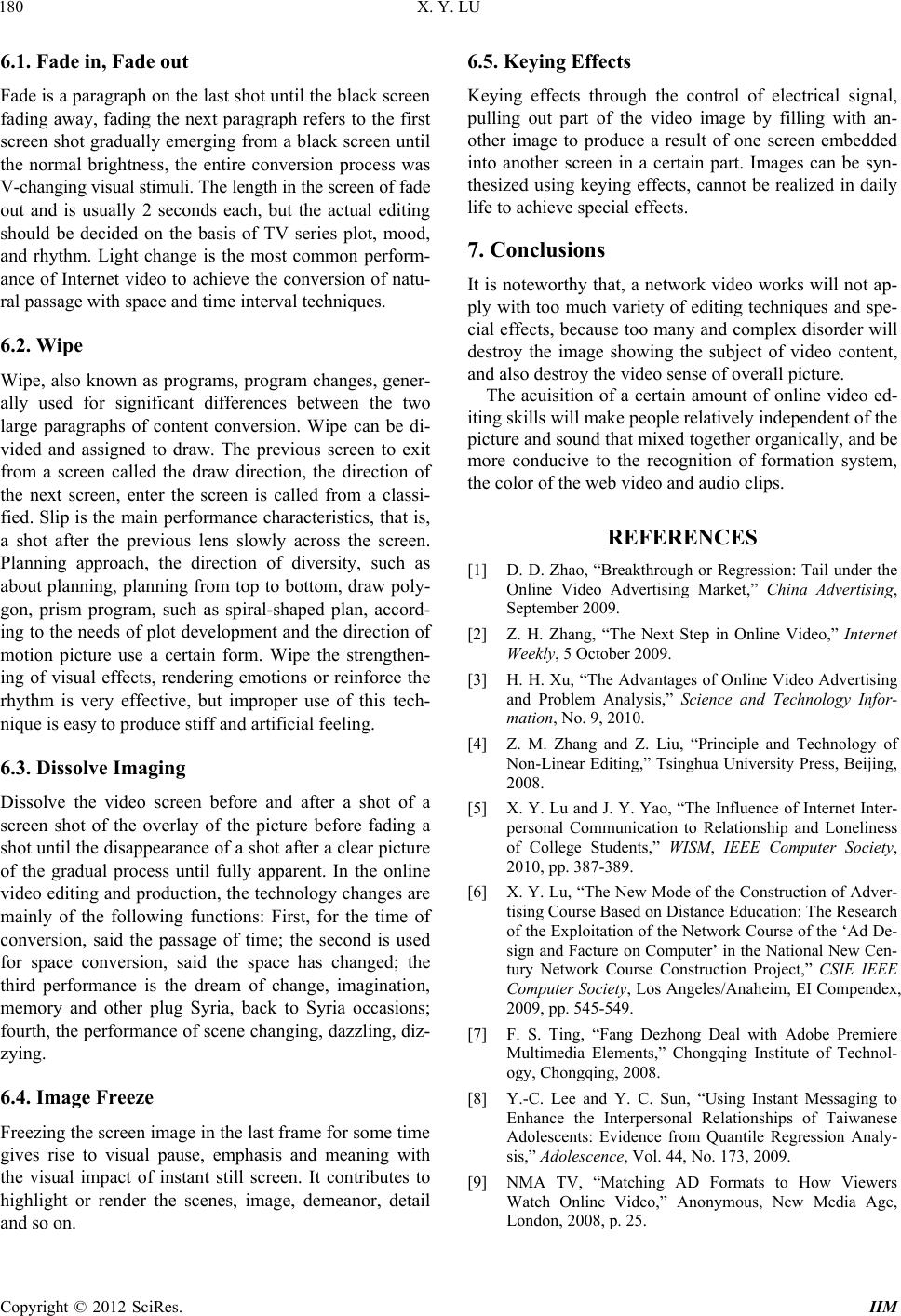Paper Menu >>
Journal Menu >>
 Intelligent Information Management, 2012, 4, 177-180 http://dx.doi.org/10.4236/iim.2012.45026 Published Online September 2012 (http://www.SciRP.org/journal/iim) Online Video Editing and Production Skills* Xiaoyan Lu College of Media and International Culture, Zhejiang University, Hangzhou, China Email: xinwen1@zju.edu.cn Received April 12, 2012; revised May 13, 2012; accepted May 22, 2012 ABSTRACT Internet video is a video service that can be uploaded on the Internet and played online. As online video post-production of the key aspects related to the editing work is often the final stage of artistic effects, the acquisition of a certain amount of online video editing skills is important. It will make people relatively independent of the picture and sound that mixed together organically, and be more conducive to the recognition of formation system, the color of the web video and audio clips. Keywords: Online Video; Internet; Editing Skills 1. Introduction Internet video is a video service that can be uploaded on the Internet and played online. Online video post produc- tion of the k ey asp ects related to th e ed iting work is of ten the final stage of the artistic effects. Nowadays, the non- linear editing system is more commonly u sed on network video material and is combined with 3DSMAX, Afteref- fect, Photoshop, Flash, Authorware and other software synthesis technology to highlight the power of Internet video’s performance and artistic charm. 2. Montage Theory Montage video editing prov ides a theoretical ba sis for the network. A complete network video works by a number of plots is composed by paragraphs, and each paragraph of a plot consists of the montage of several paragraphs (or sentences montage). “Montage” is derived from the French, the original architectural term, meaning compo- sition, assembly. Later become on e of the main narrative and performance of its means on creating and editing video and audio synthesis. With the way of montage, video enjoys great freedom of space and time jumping. Montage editing relies on the intrinsic link to create the lens topic, which guides the audiences to interpret events and strengthens the events through the combination of image and sound. What’s more, through the combinatio n of ways, the director would be able to express his ideas. Internet video is a collection of the greatest features of voice, video, text and other elements of advantages, which can attract the audiences’ attention within a short time. Therefore, it requires full utilization of this particu- lar montage editing techniques, and left the audiences with space of imagination in the meantime. It is difficult to have an exact accurate conclusion on the classification of montage. According to the process- ing view of means of montage, it can be divided into rhythmic montage, analytical montage, Lenovo montage, montage and other types of modeling; and according to the function, it can be divided into narrative montage, montage and rational expressive montage. Rhythmic montage segment mainly for the screen of time, one is such a time slice, the other is the time frame or clip the situation gradually decreasing and increasing. Lenovo montage composes of different compared and conflict contents. Compared the images associated with one subject by two different groups received from the event or scene before and after montage, for the expres- sion of two related feelings caused by a subject. The montage in the online video advertising is in the highest frequency of use, which makes up the main concept of the unity of the performance of concrete problems, re- flecting the subtle h andling of the ads enh anced the artis- tic expression of online video advertising. Many lens in the online video advertising performance and the group are often different from the situation of a simple narrative, the performance of the content does not necessarily have strong logic, then the director or pro- duction division by modeling similar morphology, mo- tion and psycholog ical style trend similarity with the fast way to stack in series screen. We will shape this rela- tionship due to the formation of art called montage style *This research was sponsored by Key Research Base of Social Science: Zhejiang Social Sciences Research Center of Communication and Cul- tural Planning Issues, and also sponsored by Digital Future and Media Institute for Social Research of Zhejiang University. In this paper, results from Experimental teaching demonstration centers in Zhejiang- Media experiment teaching centre of Zhejiang University. C opyright © 2012 SciRes. IIM  X. Y. LU 178 montage. Of course, this way of modeling montage pro- duction methods are generated from the perspective of the director which can be classified as associative mon- tage, but feeling a bit far-fetched. It is always presented as performance-based shape modeling montage and structure similarity, such as curve similar to the direction, other art elements similar to the movement. Montage is a unique way of thinking and artistic im- ages, and the basic structure of the network video tools. It not only includes the lens, scenes, paragraphs, and all the arrangements with the combination of artistic skills, but also works in post-production and edition, and act as a guideline for certain internet staff work and audio ma- terial for the video. 3. Online Video Editing In the non-linear editing work, the need for video per- formance, the action, mood, tempo editing point selection must follow the objective law, in line with the logical development of things, and meet people’s thi nking habits. 3.1. Different Types of Online Video Editing A variety of show type video, most of the dance-based, and its clip point basis having their songs and music melody, rhythm, phrasing, music section to choose, and many strengths on the beat in the music switch lenses. TV type video, most of the development of the plot and characters depend on changes in emotional choose edit points. For network interview shows, usually those con- versations and interviews with the atmosphere to switch lenses. Network feature documentaries and documentary video editing shou ld strive to be authentic, especially the long shots, you should try to ensure the integrity of the lens to avoid the cut being too small or broken. Competi- tive sports video, with a strong dynamic, strong dynamic place should be selected as the switching point. 3.2. Select the Length of the Video Camera In general, do not view the video camera, video screen and the number of information constitute the complexity of the screen will affect the choice of the length of the lens. On the Scene, the panoramic camera images to stay longer; the shorter number of close-range shot, close-up shorter; to screen information, the screen stays longer with amount of information, and shorter with less of in- formation; to a complex picture extent, a complex picture stays longer, shorter and vice versa. 3.3. Video Screen Editing Technique Errors in the lens during shooting can be compensated to some extent in post-produ ction by using the sub-cut, cut- out and fight a shot cut. Sub-cut is to cut a lens into two or more, cutout is a complete shot in the action to remove a part of the screen without generating a sense of jump. Fight a shot cut is repeated splicing, generally used in the lens case which is not long enough and can not Bupai (reshoot) before use. These editing techniques contribute to balance the video rhythm better, in which way the dra- matic effect can be strengthened by the screen and flu- ency. 4. Online Video Lens Group Received The network needed for exciting video montage down, the lens needs to be connected in coherence, for the au- dience to receive a better understanding of video content. The different lens combinations will lead to the transfor- mation sequence of different artistic effects. In addition to footage of the group means of the optical principles, switching the camera directly through th e conv ergence of law, the plot will be more natural and smooth. 4.1. Video Camera Connected to a Logical Group Shot of the group is required to meet people’s life ex- perience and in line with the logic of thinking, which is the basis for the audience to read the video. Therefore, the lens group must consider the audiences’ visual re- quirements, lead the audience in mental activity, we must also meet the visual enjoyment. Video camera should follow the group and the law of “move then the dynamic and static access of static, dy- namic and static phase to the transition”. The action is consistent to achieve the purpose of smooth and simple transition; the previous screen done a full body move- ment then stops, connecting to a movement from rest to start the lens to achieve a “static access quiet”. 4.2. Shot Group then the Unity of Tone Color The tone color should maintain consistency, regardless of network video screen is black and white or color. If the connection between two lens groups is too brightness or with strong color contrast (except for special needs), people would feel awkward, stiff, non-coherent and with- out a clear expression of content. 4.3. The Rhythm of the Video Camera Connected Transformation Group The subject matter, style, style and ambience, character emotions, plot progress and the rhythm of the lens group of network video receive a total basis. In addition to video rhythm performers, camera movement and trans- formation, the scene reflects the spatial and temporal changes with music and other factors outside the group need access to the use of means, which should strictly adhere to the size and number of the lens. Lens group Copyright © 2012 SciRes. IIM  X. Y. LU 179 should pay attention not on the seats or the King of mu- tual coordination and cooperation. If you encounter with the same flight, even with the Scene with the main screen, not directly connected group, this screen led screen simi- lar lack of change in composition. But the picture chan- ges a bit of a jump will make th e audience an eye move- ment, destroying the continuity of images and coherence of thinking. Others such as the direction of the screen, the length of time controlled by camera, unity of color and tone, rhythm and harmony and other factors, and that video editing needs attention which strives to make edit- ing a harmonious flow of network video screen. It is necessary to meet people’s logical thinking and teaching law, which is also rich in artistic expression. 5. Combination of Audio Editing and Sound and Picture Sound and picture are two important elements in network video, the two instruments working together allows on- line video to be viewed and listened. In network video, audio language with rich elements of performance of its forms and manifestations is able to add clear and accu- rate information to the visualized video. Therefore, the audiences can not only see and hear, but also feel. The term of Voices here refers to the concept which consists of three parts: language, music and sound. Language is communication and the primary means of transmitting information, logical, systematic and complete expression to people’s thoughts and feelings, which includes dia- logue, narration and monologue. Music, including instru- mental and vocal music, often in online video in the form of voice-over, the atmosphere can help screen contrast, infection audience. Sound refers to all sound except hu- man voice and music. It has a broad scope, including almost all kinds of sounds of the nature, such as wind, thunder, bark and so on. In network video, the audio mainly subordin ates to the picture environment. A video clip with non-linear editing is usually a com- bination of the two parts to be added to the time of se- lected material line, the audio files will automatically appear in the associated audio track to correspond with the associated video and audio. However, in network video editing process, you may only need a part of the video or audio, which requires cutting off the relationship between the two, also known as the melting operation. Through video and audio solutions chain operations, non-linear editing system can be decomposed into sepa- rate video and audio section, which can be moved and edited individually. Audio files and video files are han- dled in the same way, which is proceeded by relying on filters and switch techniques. If this software in Premiere, sound combinations are divided into three categories: sound comparison (meaning different sounds simultane- ously, so that in contrast to the main sound produced in the contrasting roles), the sound of the coverage (in the same footage appear on a variety of similar sounds in parallel, there is a voice above th e sound on the other, to draw attention to the attention of sound body), sudden turn of sound and silence (sound and silent alternating). Sound editing and processing include: play, clip, gain and gradual change, swing left and right channels and volume balance adjustment, and the usage of audio mixer (mixer). Sound production and production are inextricably link- ed images, sounds act as bridge, so that the screen is con- nected smoothly. Rendering the sound is conducive to the psychological state of characterization and helps heighten atmosphere, so it still faces painting activities. Sound and images are together in a certain way, includ- ing the unity of sound and picture, sound and picture on the digital picture and sound separation of three types. Combined with sounds, the correspondence created by sound and images and that between the pictures is in consistent with the audio content, which makes visual information and auditory information simultaneous, and meets audiences’ needs and enhances picture realism in the meantime. Some networks, such as live, online news Tong Qisheng, etc., are generally sound and picture ecu- menical relations. Sound and picture on the digital sound and pictures is to maintain the internal relations, but the sound and the picture is not one to one, they exists in their own separate basis. However, the organic combina- tion of clips makes the meaning of sound in accordance with the contents of the screen, which can be interpreted from the overall performance of the video content. Sci- ence and education videos in the network, some descrip- tion, analysis, explanatory language belongs to the rela- tionship bet ween sound a n d p i ct ure on the bit. The immediately points of sound and picture are differ- ent, the relationship between the formation is of a com- pletely opposite. The opposition and collision caused by sound and pictures would result in a strong artistic effect. Sound and picture are complementary and mutually reinforcing, understanding and properly handling of rela- tions between sound and picture can make sound and picture harmonious, and improve the performance of network vi deo greatly . 6. Online Video Editing Effects In the network often need to switch to video games, it allows the lens to achieve the natural switch to make the story mo re co here nt and easy. Th e firs t is the tr ansfo rma- tion scene of the conversion between the lens which in- cluds the montage and plot and the conversion between paragraphs transition between paragraphs. In order to make the network video content be more rational, level of development clearer, transition effect is in the transi- tion between scenes in some way needed. Copyright © 2012 SciRes. IIM  X. Y. LU Copyright © 2012 SciRes. IIM 180 6.1. Fade in, Fade out Fade is a paragraph on the last shot until the black screen fading away, fading the next paragraph refers to the first screen shot gradually emerging from a black screen until the normal brightness, the entire conversion process was V-changing visual stimuli. The length in the screen of fade out and is usually 2 seconds each, but the actual editing should be decided on the basis of TV series plot, mood, and rhythm. Light change is the most common perform- ance of Internet video to achieve the conversion of natu- ral passage with space and time interval techniques. 6.2. Wipe Wipe, also known as programs, program changes, gener- ally used for significant differences between the two large paragraphs of content conversion. Wipe can be di- vided and assigned to draw. The previous screen to exit from a screen called the draw direction, the direction of the next screen, enter the screen is called from a classi- fied. Slip is the main performance characteristics, that is, a shot after the previous lens slowly across the screen. Planning approach, the direction of diversity, such as about planning, planning from top to bottom, draw poly- gon, prism program, such as spiral-shaped plan, accord- ing to the needs of plot development and the direction of motion picture use a certain form. Wipe the strengthen- ing of visual effects, rendering emotions or reinforce the rhythm is very effective, but improper use of this tech- nique is easy to produce stiff and artificial feeling. 6.3. Dissolve Imaging Dissolve the video screen before and after a shot of a screen shot of the overlay of the picture before fading a shot until the disapp earance of a shot after a clear picture of the gradual process until fully apparent. In the online video editin g and production, th e technology changes are mainly of the following functions: First, for the time of conversion, said the passage of time; the second is used for space conversion, said the space has changed; the third performance is the dream of change, imagination, memory and other plug Syria, back to Syria occasions; fourth, the performance of scene changing, dazzling, diz- zying. 6.4. Image Freeze Freezing the screen image in the last frame for some time gives rise to visual pause, emphasis and meaning with the visual impact of instant still screen. It contributes to highlight or render the scenes, image, demeanor, detail nd so on. a 6.5. Keying Effects Keying effects through the control of electrical signal, pulling out part of the video image by filling with an- other image to produce a result of one screen embedded into another screen in a certain part. Images can be syn- thesized using keying effects, cannot be realized in daily life to achieve special effects. 7. Conclusions It is noteworthy that, a network video works will not ap- ply with too much variety of editing techniques and spe- cial effects, because too many and complex disorder will destroy the image showing the subject of video content, and also destroy the video sense of overall picture. The acuisition of a certain amount of online video ed- iting skills will make peop le relatively ind epen d ent of the picture and sound that mixed together organically, and be more conducive to the recognition of formation system, the color of the web video and audio clips. REFERENCES [1] D. D. Zhao, “Breakthrough or Regression: Tail under the Online Video Advertising Market,” China Advertising, September 2009. [2] Z. H. Zhang, “The Next Step in Online Video,” Internet Weekly, 5 October 2009. [3] H. H. Xu, “The Advantages of Online Video Advertising and Problem Analysis,” Science and Technology Infor- mation, No. 9, 2010. [4] Z. M. Zhang and Z. Liu, “Principle and Technology of Non-Linear Editing,” Tsinghua University Press, Beijing, 2008. [5] X. Y. Lu and J. Y. Yao, “The Influence of Internet Inter- personal Communication to Relationship and Loneliness of College Students,” WISM, IEEE Computer Society, 2010, pp. 387-389. [6] X. Y. Lu, “The New Mode of the Construction of Adver- tising Course Based on Distance Education: The Research of the Exploitation of the Network Course of the ‘Ad De- sign and Facture on Computer’ in the National New Cen- tury Network Course Construction Project,” CSIE IEEE Computer Society, Los Angeles/Anaheim, EI Compendex, 2009, pp. 545-549. [7] F. S. Ting, “Fang Dezhong Deal with Adobe Premiere Multimedia Elements,” Chongqing Institute of Technol- ogy, Chongqing, 2008. [8] Y.-C. Lee and Y. C. Sun, “Using Instant Messaging to Enhance the Interpersonal Relationships of Taiwanese Adolescents: Evidence from Quantile Regression Analy- sis,” Adolescence, Vol. 44, No. 173, 2009. [9] NMA TV, “Matching AD Formats to How Viewers Watch Online Video,” Anonymous, New Media Age, London, 2008, p. 25. |

